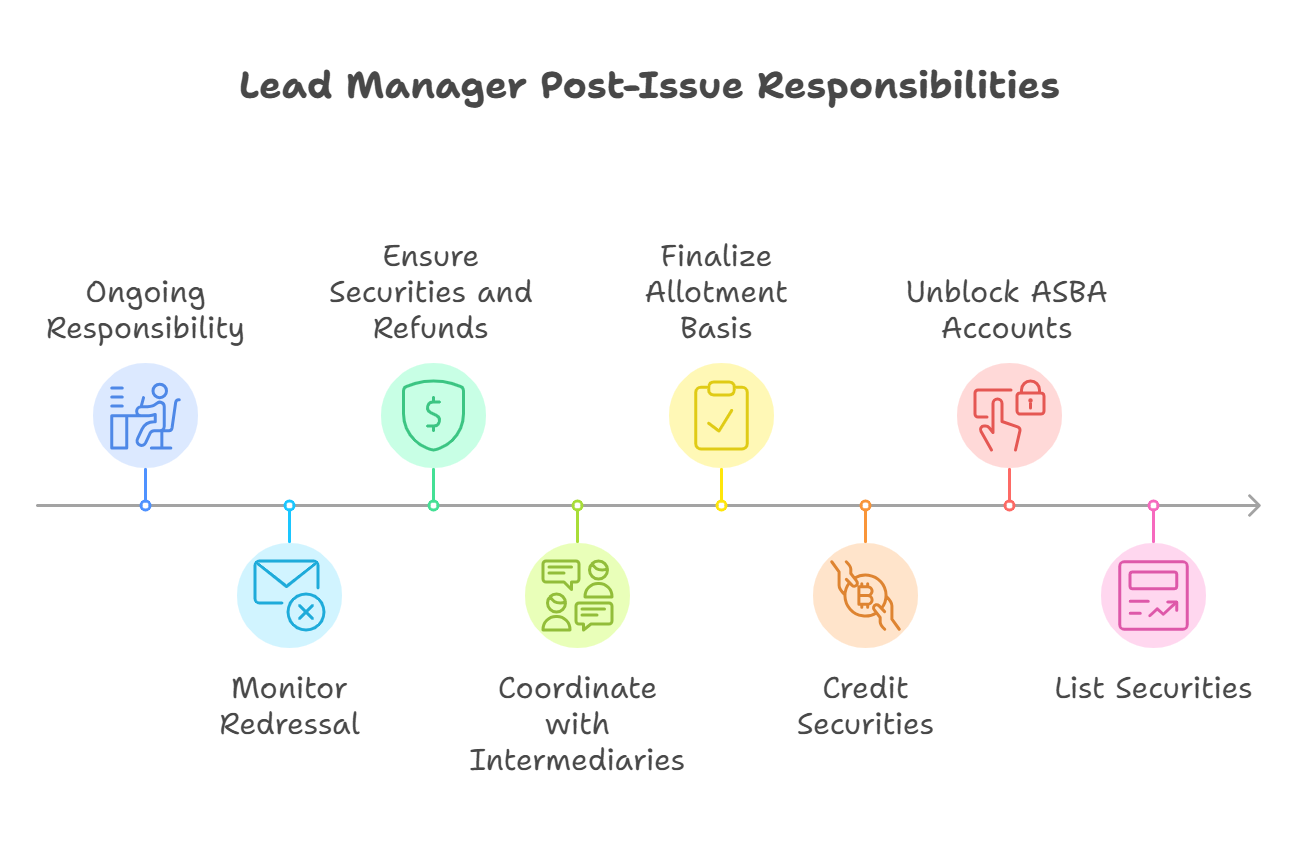Lead Manager: Role Overview
A Lead Manager is responsible for overseeing the progress and performance of an office or department. This involves a range of activities, including:
- Performance Monitoring: Creating progress reports and analyzing documentation.
- Resource Management: Managing budgets and procuring necessary supplies.
- Strategic Planning: Developing strategies for lead generation and achieving targets.
- Team Leadership: Spearheading projects, motivating staff, and ensuring adherence to company policies.
Key Responsibilities
Lead Manager responsibilities can vary significantly but often include examples such as:
- Team Leadership: Leading and managing teams to achieve optimal productivity.
- Process Improvement: Defining and implementing processes and procedures for improved efficiency.
- Social Media Management: Managing social media presence to increase visibility.
- Employee Management: Managing payroll, performance evaluations, and development opportunities.
- Customer Service: Handling customer service issues and resolving emergencies.
- Compliance: Establishing and maintaining internal audit procedures for regulatory compliance.
- Operational Management: Managing daily operations, delegating tasks, and managing inventory.
- Mentoring and Coaching: Mentoring managers on various topics (change management, time management, etc.).
- Service Delivery Improvement: Identifying and implementing opportunities to improve service quality.
Skills & Personality Traits
Lead Managers often possess a combination of technical and soft skills. Top skills based on resume analysis include:
-
Technical Skills:
- Safety Procedures (Ensuring adherence to safety guidelines)
- Sales Floor Management (Providing excellent customer service and product knowledge)
- Gross Margin Management (Maintaining optimal profit margins)
- Specialized Skills (e.g., PET, Product Knowledge, etc.)
Soft Skills (Essential for Effective Leadership):
-
Communication Skills: Clearly and persuasively conveying information.
- Example: Managing hazardous materials communication and safety protocols.
- Time-Management Skills: Effectively managing multiple tasks and deadlines. * Example: Accomplishing sales goals and meeting deadlines effectively.
-
Leadership Skills: Coordinating resources, people, and policies to direct the organization.
- Example: Receiving recognition for exceptional leadership and operational management.
-
Problem-Solving Skills: Identifying and resolving organizational issues.
- Example: Developing risk management plans and coordinating
- issue resolution.
Lead Manager Post-Issue Responsibilities
The lead manager's responsibilities extend beyond the initial offering and continue until the issue process is complete, covering all issue-related matters. This includes:
-
(1) Ongoing Responsibility: The lead manager remains responsible until the completion of the entire issue process and any subsequent issue-related matters.
-
(2) Monitor Redressal: Regularly monitor and facilitate the resolution of investor grievances arising from any issue-related activities.
-
(3) Responsibilities Continue Until: The lead manager remains responsible until all applicants have received:
- Securities certificates.
- Credit to their demat accounts.
- Refund of application monies (if applicable).
- The issuer has entered into a listing agreement with the stock exchange and listing/trading permission is obtained.
-
(4) Coordinate with Intermediaries: The lead manager is responsible for coordinating and monitoring with:
- Registrars to the issue.
- Various intermediaries. This coordination should occur regularly after the issue's closure. The goal is to monitor the flow of applications (from syndicate members, collecting bank branches, or self-certified syndicate banks (SCSBs)), application processing (including ASBA applications), and all related matters. This continues until:
- The basis of allotment is finalized.
- Securities are credited to the demat accounts of allottees.
- ASBA accounts are unblocked/refund orders are dispatched.
- Securities are listed (if applicable).
Reporting to SEBI
-
(5) Report Omissions/Commissions: Any act of omission or commission by intermediaries noticed by the lead manager(s) must be reported to SEBI (the Board).

Regulations Regarding Continuance of Association of Lead Manager with an Issue
These regulations govern how long a Lead Manager (LM) must remain associated with an issue (e.g., IPO, rights issue) after its closure.
Key Principle: The Lead Manager's responsibility and association with the issue do not end immediately after the offering. They have a continuing obligation to ensure a smooth post-issue process.
Specifics to Consider (Based on potential SEBI Regulations - check current regulations for the most up-to-date information):
-
Mandatory Association Period: There's typically a specified period (e.g., 3 months, 6 months, or longer) after the issue's closing date during which the Lead Manager must remain formally associated with the issue. This is to provide accountability and oversight.
-
Responsibilities During the Association Period: During this period, the Lead Manager is usually responsible for:
- Monitoring Issue-Related Activities: Overseeing the activities of other intermediaries (registrars, banks, etc.) involved in the issue process.
- Addressing Investor Grievances: Handling and resolving complaints and queries from investors related to the issue.
- Ensuring Regulatory Compliance: Ensuring that all post-issue activities comply with relevant regulations and guidelines. This includes things like timely allotment of shares, processing of refunds, and listing the securities on the stock exchange.
- Reporting to SEBI: Keeping SEBI informed about the progress of post-issue activities and reporting any irregularities or non-compliance.
Reasons for Extended Association: The rationale behind requiring a continued association is to ensure that investors are protected and that any issues arising after the offering are promptly and effectively addressed. It also holds the Lead Manager accountable for the overall success of the issue, not just the initial placement.
Potential Penalties for Non-Compliance: If the Lead Manager fails to fulfill their responsibilities during the mandatory association period, they may face penalties from SEBI, such as:
- Financial penalties (fines).
- Suspension or cancellation of their registration as a merchant banker.
- Restrictions on their ability to act as a Lead Manager in future issues.
Triggering Events for Disassociation: While there's a mandatory association period, there might be specific events that allow the Lead Manager to formally disassociate from the issue before the end of that period. This usually requires SEBI approval and might include circumstances where:
- All post-issue activities have been successfully completed.
- A new Lead Manager is appointed (with SEBI approval) to take over the responsibilities.
- There are exceptional circumstances that warrant disassociation.
Important Considerations:
- Check Current Regulations: Always refer to the most recent and official SEBI regulations regarding the continuance of association of Lead Managers with an issue. These regulations can change over time.
- Specific Issue Type: The requirements for the association period might vary depending on the type of issue (e.g., IPO, rights issue, debt offering).
- Listing Agreement: The listing agreement with the stock exchange might also impose additional obligations on the Lead Manager.


No Comments